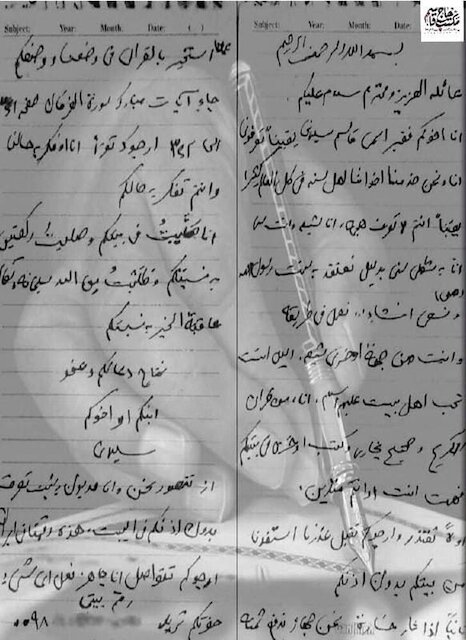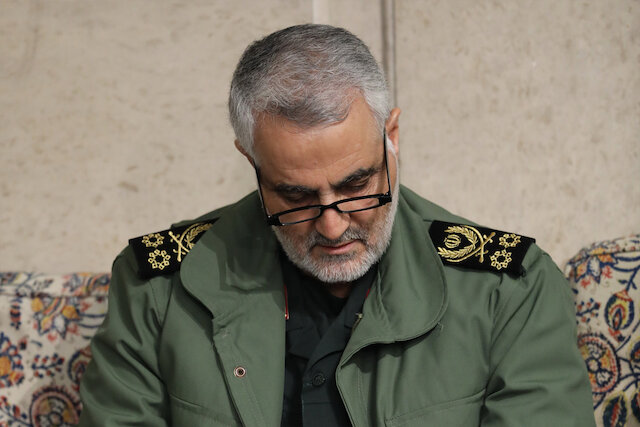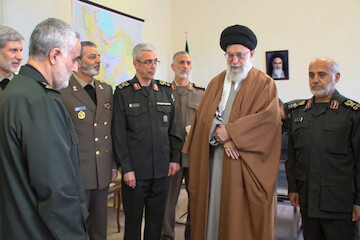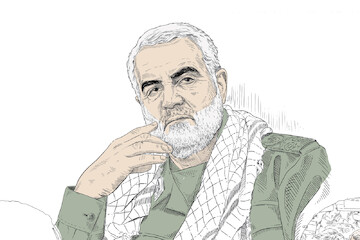Many people who have been trained in military organizations and reached high levels – regardless of the attitude and approach they had before entering this field – have had no choice but to change their previous attitude and approach in order to adapt to the structure and atmosphere of the military. This atmosphere necessitates following orders even if they contradict their personal beliefs. It is natural that tolerating and adapting to such an environment is difficult and exhausting. The most important outcome coming from this is people becoming one in their thoughts, worldview, and behavior. Martyr Qasem Soleimani, an accomplished general who had experience in various types of operations and battlefields, had strangely succeeded in making a beautiful, artistic connection between the sometimes dry, strictly-organized duties of a high-ranking military general and living as a moral person, a caring father, and a kind friend. Some of Martyr Soleimani's remarkable features will be explored in what follows.
Down-to-earth and humble
Both in his personal life and on the battlefield, he was always humble and modest in his appearance, clothes, manner, and behavior. Contrary to his position, the amenities he had in life were similar to those of an ordinary person. In many ceremonies, such as in the funerals of martyrs and his comrades, when meeting with the families and children of the martyrs, when giving speeches, or in public meetings, he would appear without any formality and would avoid becoming the center of attention. Once, he was scheduled to appear in a ceremony hosted by IBNA to honor the IRGC Quds Force for successfully defeating Daesh. Upon realizing that the ceremony was about honoring him personally, General Soleimani did not participate in the event and sent a representative instead. The down-to-earth, humble attitude of the general was also manifest when he was on the battlefield and among his comrades. His relationship with his forces was more like the relationship between a father and a son or between two brothers than between a commander and his soldiers. The soldiers followed his orders more out of their own inner inclination than out of a feeling of compulsion due to being in the military. One of the most important examples of the general’s down-to-earth, humble behavior was that everyone knew him by his first name and called him “Haj Qasem”.
Martyr Soleimani's simplicity, gentleness, and kindness toward his fellow soldiers
Care and devotion to the people
When he was socializing and meeting with people, you could always find the general smiling and cheerful. For this reason, he spoke with people face to face at every opportunity. Although General Soleimani was an administrator and senior military commander of the country and he was naturally very busy, he devoted considerable time to listening to people’s concerns and complaints. Young people who wanted to meet him could easily approach him and even take a selfie with him. When he saw children and toddlers somewhere, he would chat and play with them. He would personally attend the burial ceremonies of his comrades and visit their families to comfort them.
Martyr Soleimani with the people, taking selfies with the youth, and his gentleness in dealing with his soldiers
Ethical even in war
A tough battle is a place where subtle moral concerns are not taken seriously. As a general rule, things that are condemned under normal circumstances are not typically mentioned as violations of rights in a war situation. In this context, General Soleimani’s “awareness of ethics” in the midst of bullets and shrapnel flying all around was a remarkable, thought-provoking phenomenon. When the sound of firearms going off in a war zone could be heard here and there, the general would give a short speech to a group of the Resistance fighters who were preparing to carry out a difficult operation against the Daesh. Perhaps for those who are familiar with war literature, the first idea that comes to mind from the moral speeches of General Soleimani is that the general was advising his forces to refrain from assaulting prisoners or treating women and children brutally. But this assumption reflects something far narrower than Martyr Soleimani’s moral concern as a Muslim. Perhaps one can see a fragment of Martyr Soleimani’s moral concern in his own words where he said, “We, who are here, must be careful about what is permissible and what is forbidden. ... We cannot just take over people’s homes.” The idea that the body and soul of civilians in the war zone should not be harmed was obviously one of the principles of Martyr Soleimani’s war ethics, which were based on Islamic principles and thoughts. But the general’s recommendation was that even people’s property and homes in war zones should not be seized or attacked, let alone their bodies, lives, and souls.
Martyr Soleimani giving a short speech to some resistance fighters
Reminding others to observe moral principles was never enough for Martyr Soleimani. He was also a complete manifestation of his beliefs himself, and he repeatedly acted in accordance with his beliefs in scenes of action. For instance, one time when he was in the war zone fighting the Daesh in Syria, General Soleimani prayed in an abandoned house. After praying, he asked for permission and forgiveness from the owner of the house in a letter and even left an address and number where he could be contacted in the letter so that if the owner of the house had a complaint or request from him, he would be able to contact him.

His strict observance of ethics on the battlefield not only included human rights. It also included the rights of animals and the environment. There is a video of the general visiting the war zone. He suddenly notices a stray cow and asks the driver to pull over. He approaches the cow and feeds it some of his own bread and food. The scope of Martyr Soleimani’s moral concerns was sometimes so extensive that it included Iran’s mountain gazelles. One time in the middle of a battle against the Daesh in Iraq in the winter, he contacted IRGC headquarters and asked his colleagues to prepare fodder for the gazelles that lived on the mountain near the barracks, because it was difficult for them to find food in the cold winter.
Martyr Soleimani feeding a frightened cow wandering on the battlefield
The secret of General Soleimani’s personality
What attracts attention to General Soleimani’s character was the vastness of this man’s multidimensional existence and personality. On the one hand, he had such expertise in understanding military affairs and strategies that even his enemies, namely the front of colonization and arrogance, acknowledge his military strength and power. On the other hand, even minute moral issues were so important to him that even in his busy mind he could find a place to think about them and take appropriate action. Perhaps the reason behind General Soleimani’s lofty, focused personality – and at the same time his far-reaching, extensive existence - can be found in his thought and worldview. As a Muslim raised in the pure Islamic school of Prophet Muhammad (pbuh), General Soleimani had reached this belief that the field of human life and existence is truly vast, from worshiping, praying, and being alone with God, to paying attention to and responding patiently and lovingly to the expressions of need of ordinary people, to never getting tired of bravely defending the oppressed, innocent, and defenseless against the oppressive Daesh or the usurping Zionist regime. The pure Islam of Prophet Muhammad (pbuh) had united all the physical, mental, and spiritual powers of Qasem Soleimani around monotheism and God’s satisfaction in such a way that whatever was defined as a divine duty attracted the attention of General Soleimani.
The Leader of the Islamic Revolution, Imam Khamenei, said the following about General Soleimani’s personality: "He loved all human beings and he sacrificed himself for everyone. Moreover, he was a man of spirituality, purity, and piety... . In the deserts and mountains of such and such countries, he faced different enemies."



Comment